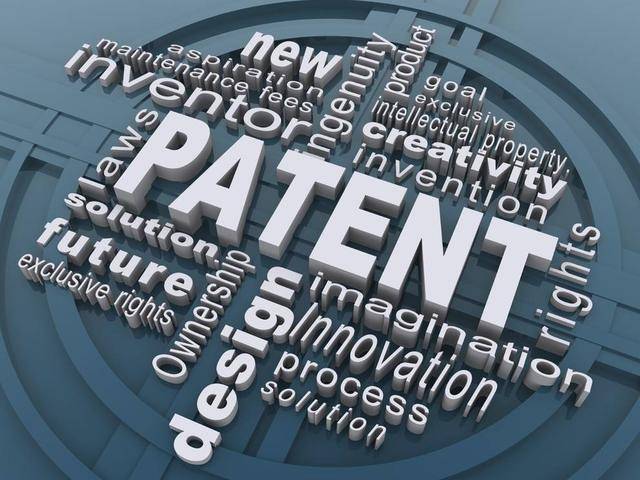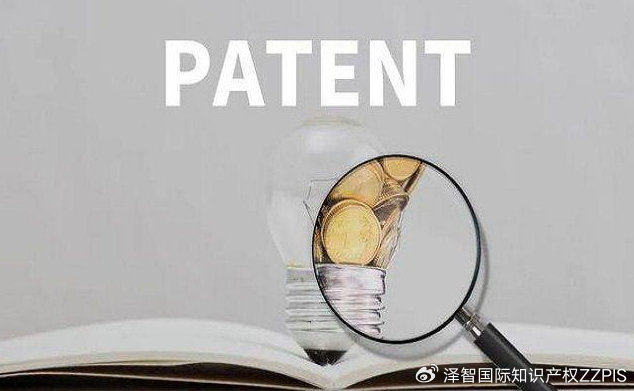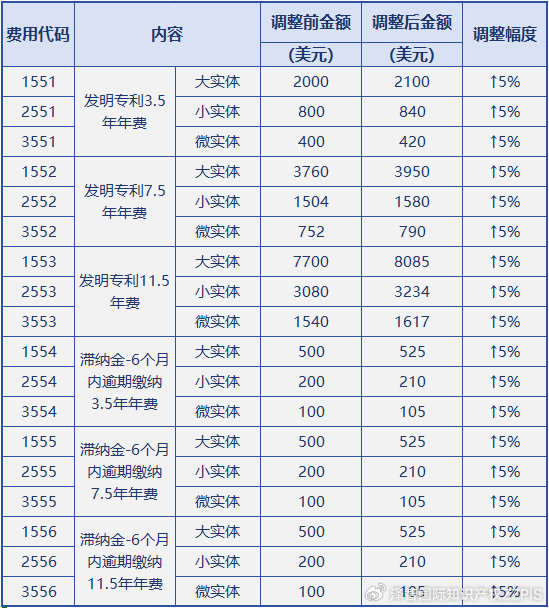
The United States Patent and Trademark Office proposes to set or adjust 455 patent fees, including the introduction of 73 new fees, which apply to large, small and micro entities.
Compared to the current fees, this proposal would significantly increase the regular patent filing and examination fees and slightly increase the annual patent fees to ensure the financial sustainability of the USPTO. Some of the fees have also been reduced as the actual needs of applicants are less pressing. Applicants who qualify for small entity and micro-entity reductions will continue to enjoy the corresponding percentage of concessions. The fees listed in this article are all examples of large entities.
* Provisional patent application period extension: 1 month extension reply: will be reduced from $220 to $50, a decrease of 77%; 2 months deferred response: will be reduced from $640 to $100, a decrease of 84%; 3 months deferred response: will be reduced from $1,480 to $200, a decrease of 86%; 4 months deferred response: will be reduced from $2,320 to $400, a decrease of 83%; 5 months deferred response: will be reduced from $3,160 to $800, a 75 percent decrease.
Rationale: Provisional applications are not reviewed and the applicant's need for expedited processing is not urgent. This fee adjustment relieves the financial burden on applicants who are still deciding whether to proceed with non-provisional applications.
* Consider the pilot program after final rejection: $500.
Rationale: In FY 2022, approximately 60,000 AFCP 2.0 requests were submitted, representing more than 10 percent of the total, and the review time exceeded 100,000 hours, resulting in more than $15 million in costs and review communication costs to the USPTO.
* Disclosure Statement: Additional surcharges are charged based on the cumulative number of citations listed by the applicant in the application. If more than 50 information items are cited, the first fee of $200 will be paid. If more than 100 but not more than 200 items of information are cited, a second fee (in the amount of US $500) will be paid, less the fee previously paid; If the number of references exceeds 200, a third fee (amounting to $800) will be paid, also less the previously paid fee.
Reason: The USPTO receives a large number of citations submitted on IDS, sometimes in the thousands, and only applies to a small percentage of applications. Many IDS submissions have a negative impact on the efficiency of audits and increase the pressure on auditors.
* $2,200 if the application or claim is filed five years after the earliest priority date; $3,500 if the application or claim is filed eight years after the earliest priority date; The new fee will apply to "late filed" subdivision, renewal and partial renewal patent applications.
Reason: Because maintenance fees are based on the grant date and patent duration is based on the priority date, a new tiered fee system will be set for continuing applications filed more than five or eight years after the priority date, or applications that explicitly make a delayed priority claim. This cost may affect about 27% of continued applications. This fee will partially compensate for the maintenance income forewent as a result of the applicant's late submission of the continuing application, or recover the front-end costs of the extended priority claim practice.

* Design application fees, search fees, examination fees and licensing fees will increase by an average of about 50%. The filing fee will increase 36 percent from $220 to $300.
Rationale: Currently, the USPTO is unable to recover the cost of design review because patentees are not required to pay an annual design fee, a situation exacerbated by the rapid increase in the number of applications by microentities, mainly foreign entities.
* If the total number of claims exceeds 20, the fee per claim will increase by 100 per cent from US $100 to US $200; With more than three separate claims, the fee for each claim increased by 25% from $480 to $600.
Reason: To prevent applicants from filing more excess claims in order to avoid paying the relatively high application fee for continuations.
Patent Term Extension: Under Section 156 of the U.S. Patent Act for Drug Patent Term extension system, the fee for applying for patent term extension will increase from $1,180 to $6,700, an increase of 468%; The initial filing fee for a temporary patent term will increase by 200% from $440 to $1,320, and the fee for each subsequent filing will increase by 196% from $230 to $680.
Rationale: There is a serious mismatch between the current fee and the cost of the USPTO's review of Ptes.
* End-of-term waiver: Separate the end-of-term waiver fee from the statutory waiver fee and increase the end-of-term waiver fee proportionally based on the submission time. Prior to the first substantive review: from $170 to $200, an increase of 18 per cent; Prior to final review: from $170 to $500, an increase of 194%; Upon final review opinion or approval: from $170 to $800, an increase of 371%; On or after filing a notice of appeal: from $170 to $1,100, a 547% increase; After the patent is granted: from $170 to $1,400, an increase of 724%.
Reason: to encourage applicants to clearly propose to abandon part of the patent protection term of their patents as soon as possible under certain circumstances, in order to alleviate the problem of repeated authorization encountered in the patent examination process, and to avoid excessive pressure caused by the USPTO to recalculate the patent term due to late clarity, and improve efficiency.
* Patent Term Adjustment: The fee for applying to reconsider their patent term adjustment will increase 43% from $210 to $300.
Rationale: Recover the costs incurred by the USPTO to reconsider the patent term adjustment.
* Continued review of requests: The first request will increase by 10 per cent from $1,360 to $1,500; The second request will increase from $2,000 to $2,500, a 25% increase; Third and subsequent requests will increase from $2,000 to $3,600, an 80 percent increase.
Rationale: Because the delay in review caused by the explicit presentation of RCE several times may reduce the potential benefit of future maintenance costs. Incentivize applicants to receive further review and authorization upon submission of appeal requests.
Delayed review: The first request will increase from $220 to $300, a 36% increase; Subsequent requests will increase from $220 to $450, a 105 percent increase.
Rationale: It is proposed to delete the deferred review fee under 37 CFR 1.103 (a) from the broad category referred to in 37 CFR 1.17 (g), creating a tiered system with higher fees for subsequent deferred reviews. It is not easy to have a significant impact on the patent application of small and micro entities.


USPTO拟议费用调整详见:https://www.uspto.gov/about-us/performance-and-planning/fee-setting-and-adjusting